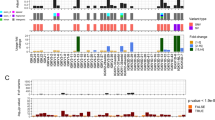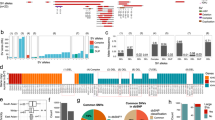Abstract
IMMUNOGLOBULINS are proteins composed of two heavy and two light chains covalently linked by interchain disulphide bonds1. There are two types of light chains, κ and λ. The κ type human light chain is associated with an antigenic marker called Inv (ref. 2). Three types of antigens are recognised namely Inv (1), Inv(2) and Inv(3). Ropartz, Rivat and Rousseau3 have shown that these Inv markers are inherited through a series of three alleles Inv1,2, Inv1 and Inv3. About 98% of Caucasoid individuals who have the Inv(1) antigen also have the Inv (2) antigen3. Since fewer than 20% Cauca-soids have the Inv(1, −2) phenotype4 it follows that the Inv1 allele is rare in this race.
This is a preview of subscription content, access via your institution
Access options
Subscribe to this journal
Receive 51 print issues and online access
$199.00 per year
only $3.90 per issue
Buy this article
- Purchase on SpringerLink
- Instant access to the full article PDF.
USD 39.95
Prices may be subject to local taxes which are calculated during checkout
Similar content being viewed by others
References
Porter, R. R., Basic Problems of Neoplastic Disease (edit. by Gellhorn, A., and Hirschberg, E.), 177 (Columbia University Press, New York, 1962).
Terry, W. D., Fahey, J. L., and Steinberg, A. G., J. exp. Med., 122, 1087 (1965).
Ropartz, C., Rivat, L., and Rousseau, P. Y., Proc. Ninth Congr. int. Soc. Blood Transf., 455–458 (S. Karger, 1964).
Ropartz, C., Rousseau, P. Y., Rivat, L., Baitsch, H., Ritter, H., Pinkerton, F. J., and Mermod, L. E., Acta genet. Basel, 14, 25 (1964).
Milstein, C., Nature, 209, 370 (1966).
Baglioni, C., Alescio Zonta, L., Cioli, D., and Carbonara, A., Science, N. Y., 152, 1519 (1966).
Milstein, C., Milstein, C. P., and Feinstein, A., Nature, 221, 151 (1969).
Milstein, C. P., and Deverson, E. V., Biochem. J., 123, 945 (1971).
Steinberg, A. G., Wilson, J. A., and Lanset, S., Vox Sang., 7, 151 (1962).
van Loghem, E., Shuster, J., and Fudenberg, H. H., Vox Sang., 14, 81 (1968).
Alepa, F. P., and Terry, W. D., Science, N. Y., 150, 1293 (1965).
Steinberg, A. G., Adv. Immunogenet., 75 (edit. by Greenwalt, T. J.) Lippincott Co., Phila. (1967).
Ponstingl, H., Hess, M., Langer, B., Steinmetz-Kayne, M., and Hilschmann, N., Hoppe-Seyler's Z. physiol. Chem., 348, 1213 (1967).
Appella, E., and Ein, D., Proc. nat. Acad. Sci., U.S.A., 57, 1449 (1967).
Poljak, R. J., Amuzel, L. M., Avey, H. P., Chen, B. L., Phizackerley, R. P., and Saul, F., Proc. nat. Acad. Sci. U.S.A. 20, 3305 (1973).
Schiffer, M., Girling, R. L., Ely, K. R., and Edmundson, A. B., Biochemistry, 12, 4620 (1973).
Author information
Authors and Affiliations
Rights and permissions
About this article
Cite this article
MILSTEIN, C., STEINBERG, A., MCLAUGHLIN, C. et al. Amino acid sequence change associated with genetic marker Inv(2) of human immunoglobulin. Nature 248, 160–161 (1974). https://doi.org/10.1038/248160a0
Received:
Issue date:
DOI: https://doi.org/10.1038/248160a0
This article is cited by
-
Genetic determination of antibody specificity
Naturwissenschaften (1978)



